Antibiotics for flu and colds are used to fight the pathogens of these ailments. Some people ignore the symptoms of acute respiratory illness and simply trigger the illness. Others practice self-treatment with antibiotics, antiviral drugs, symptomatic agents, which is by no means favorable for the body, since it can contribute to the transition of the disease to the chronic stage. Can the flu be treated with antibiotics and what medications suitable for this, we will tell later.
Should I take antibacterial agents for the flu?
Many people believe that antibiotics can cure all diseases. But they only act on bacteria, and their effect does not apply to viruses. Antibacterial medicines for influenza have no effect. But why, then, are they often recommended?
It is necessary to take antibiotics for influenza when there is a suspicion of complications of the disease.
Improper treatment of colds or flu is fraught with the formation of the following pathologies:
- acute bronchitis;
- acute pneumonia;
- inflammation of the middle ear;
- pyelonephritis;
- acute tonsillitis.
The causative agents of such diseases are bacteria, not viruses. A person can get sick with them due to the fact that his body is weakened. In this case, antibiotics for the flu are prescribed to prevent complications from developing. In any case, the treatment regimen and dosage of such drugs is determined only by the doctor. The list of suitable drugs is quite wide.
Modern antibiotic agents
Treatment of influenza with antibiotics is prescribed only in cases where the patient's body cannot cope with the infection on its own. Before starting antibiotic treatment, it is imperative to undergo antiviral therapy. Antibiotics for influenza should also be used if the patient's condition deteriorates rapidly.
So, if you suspect influenza, antibiotics are prescribed only with strict indications for this. The advantage is given to medications of a wide spectrum of action that act on several types of bacteria:
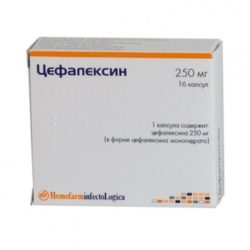
Features of the use of antibiotics for colds and flu
 Any antibacterial drugs are prescribed only by the attending physician. The duration of therapy is determined by a specialist, and it is better not to change the timing. Only in severe cases, prolongation of treatment is allowed, but not more than up to 10 days.
Any antibacterial drugs are prescribed only by the attending physician. The duration of therapy is determined by a specialist, and it is better not to change the timing. Only in severe cases, prolongation of treatment is allowed, but not more than up to 10 days.
Each antibiotic has side effects... And it is necessary to pay attention to their presence first of all, since inept use of drugs can cause dangerous manifestations in the body.
Any, even the best antibiotic, will help only under these conditions:
- It is selected taking into account all the individual characteristics of the patient's body. In order to prescribe the medicine correctly, the body is usually diagnosed before starting treatment. With a properly selected antibiotic, the first positive changes in the body are observed already on the third day.
- The doctor prescribes all antibiotics based on a thorough history analysis.

- The patient does not self-medicate.
If, after 3 days of treatment, a pronounced positive effect is not observed, it is necessary to consult a doctor again. Treatment may need to be adjusted.
Treatment of a running cold
As with any disease, it does not go without symptoms. The first signs are as follows:
- inflammation of the lymph nodes;
- runny nose, and it happens that a lot of mucus from the nose is released;
- sore throat, change in voice;
- discharge of a large number of tears;
- temperature rise (sometimes up to 38 ºС and more);
- gastrointestinal disorders.
 If a person does not consult a doctor in time, a cold will certainly develop into a chronic, neglected. And then not only the disease itself will be treated, but also its complications.
If a person does not consult a doctor in time, a cold will certainly develop into a chronic, neglected. And then not only the disease itself will be treated, but also its complications.
The choice of medicine for the treatment of influenza should be based on clinical tests. It is necessary to find out what type of bacteria is in the human body for the treatment to be most effective. Each remedy works only against a certain type of microbes.
The general principles of treatment are as follows:
- In inflammatory processes in the upper respiratory tract, penicillin antibiotics are used, such as Augmentin, Amoxiclav and others. It should be borne in mind that microorganisms resistant to penicillin can cause diseases. What antibiotic is needed in this case, only the doctor decides.
- In case of respiratory pathologies, such as pneumonia, Levofloxacin is usually used, etc. They help well in such cases.

- Thanks to the effect of cephalosporins in the composition of drugs such as Suprax, Zinnat and their derivatives, bronchitis, pleurisy and other complications of influenza are treated.
- Macrolides are prescribed for the treatment of various forms of atypical pneumonia.
The choice of antibiotics for influenza is very wide. And only a doctor can understand such a variety and prescribe the drug that will suit the patient.
When are antibiotics really needed?
Cold treatment is determined by what types of pathogenic pathogens caused it. Many people think that flu is always treated with antibiotics, but this is the deepest misconception. With acute respiratory diseases antiviral drugs are prescribed first. The expediency of their use is that they have a targeted effect on human immunity, thereby strengthening it.
Do you need antibiotics in this case? Not only unnecessary, but also dangerous.
Any use of antibiotics for influenza or acute respiratory viral infections prohibited by doctors. The earlier treatment is started antiviral drugs, the better, because the doctor and patient will be more likely to overcome the disease.
But sometimes colds are caused by bacteria. In this case, the antibiotic used will be effective. However, in order to achieve the desired result, it is necessary to know what caused the disease. For this use clinical analyzes, whose task is to isolate the pathogen.
If the choice of the drug is made incorrectly, then the person can only be harmed. In addition, due to side effects there will always be a risk of complications with such treatment.
Antibiotics during pregnancy
During pregnancy, treatment with such drugs is limited. The fact is that some of them can negatively affect the condition of the fetus and the health of the woman. This is especially important in the first trimester.
What antibiotics should pregnant women take so as not to adversely affect the unborn child? The choice of drugs is made only by a doctor.  Antibiotic treatment should only be used as a last resort. Before prescribing therapy, the doctor must conduct a diagnosis with a thorough identification of the pathogen. If it is impossible to carry out diagnostics for any reason, then the choice stops on drugs of a wide spectrum of action.
Antibiotic treatment should only be used as a last resort. Before prescribing therapy, the doctor must conduct a diagnosis with a thorough identification of the pathogen. If it is impossible to carry out diagnostics for any reason, then the choice stops on drugs of a wide spectrum of action.
The following drugs are considered the most harmless to a woman's body:
- Ampicillin;
- Oxacillin;
- Cefazolin;
- Erythromycin;
- Azithromycin.
The dosage of these drugs is determined only by the attending physician. Self-medication with antibiotics, changes in the regimen and dosage regimen of the drug are strictly not allowed. A woman must necessarily fulfill all the requirements of the doctor. Reducing the recommended dosage is very dangerous: the medicine will not have the necessary effect on the body, it will not be able to  sufficiently suppress the intensity of the infection, and it has every chance of going into the chronic stage.
sufficiently suppress the intensity of the infection, and it has every chance of going into the chronic stage.
Such drugs can only eliminate bacterial complications. Treatment of influenza during pregnancy with antiviral medicines has its own characteristics, since not all medicines are suitable for expectant mothers, some of them do great harm.
All antibiotics are powerless when the following symptoms appear in women:
- acute respiratory viral infections;
- high fever caused by a virus;
- cough;
- intestinal disorders.
The use of other drugs from the group of antibiotics is very dangerous, because they can provoke the development of congenital abnormalities in the fetus. In the first trimester of pregnancy, it is necessary to abandon any antibiotics, at this time all organs of the unborn child are laid, and the slightest deviations in this process can cause extremely unfavorable consequences.

Features of the treatment of influenza in children
Whether it is necessary to take antibacterial agents for children, only the doctor decides. In the event of symptoms of a cold in babies, one should try to refrain from such unsafe drugs and prescribe them only in severe cases. You should pay attention to the following treatments:
- the use of drugs specially prescribed by a doctor;
- compliance with bed rest;
- plentiful drink;
- diet food;
- rinsing the throat and nasal cavity;
- inhalation, rubbing.
The most unfavorable option in such cases is self-medication. It is strictly forbidden to prescribe antibiotics on your own and is not allowed under any circumstances. The child's body is not yet formed, so the antibiotic can seriously disrupt its functioning.
What is the harm of antibiotics
It has already been said above that the use of antibacterial medicines in adults and children should be carried out only under the supervision of a physician.
The harm of antibiotics is that they destroy a wide range of bacteria - both harmful and beneficial to humans. The total destruction of microorganisms leads to extremely undesirable consequences.
Pathogenic microorganisms tend to mutate and adapt to the effects of antibacterial drugs. And if a person takes drugs to which the bacteria have already developed resistance, this will not give any effect. But it will bring a lot of harm.
The most common side effects of antibiotics are as follows:
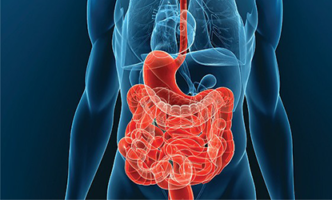
- Disorders of the functioning of the stomach and intestines. During intensive antibiotic therapy, a specialist must prescribe probiotics that normalize the activity of the gastrointestinal tract.
- Negative effect on blood composition.
- Development of allergic reactions.
- Disruption of the nervous system (development of hallucinations, dysfunction of the vestibular apparatus).
- Toxic kidney damage.
- Respiratory disorders.
- The appearance of bleeding from the nose.
When a person develops influenza and other acute respiratory pathologies, it must be remembered that they are not treated with antibiotics, for this there are special drugs. However, antibiotics may be warranted if it is necessary to cure the manifestations of diseases caused by bacteria.
Some people believe that antibiotics for the flu are the best and even the only cure, but this is far from the case. Yes, sometimes these drugs, indeed, can be indispensable for the fight against acute respiratory viral infections, when you have to cope with complications and a bacterial infection.
But in no case should you take them just like that and without the permission of a doctor. Otherwise, instead of recovering, you will face a lot of serious troubles and only complicate the situation. So it's worth talking about the rules for using antibiotics for influenza in more detail, indicating, if possible, all the indications, contraindications, results and side effects.
Flu antibiotics help fight complications and bacterial infections
Taking an antibiotic on your own can hurt yourself. However, a remedy that is correctly selected by a qualified doctor will help not only to cure an influenza infection, but also to prevent its development (that is, it is taken for prevention).
It should be noted that antibiotics used for influenza in adults are highly specialized agents that suppress bacterial infections. They act as follows: destroy the bacterial walls or prevent bacteria from developing and multiplying.
The truly effective ones are those that inhibit neurominidase, as a result of which the virion does not attach to the cell membrane.
Influenza viruses should not be considered cellular organisms, since they do not have cell walls. You can even say that they do not live, since there are no chemical reactions inside them. Accordingly, it is impossible to kill them as such - especially since viruses have protective shells. But it is really possible to destroy this shell by deactivating, that is, splitting the proteins on its surface. This prevents the virus from attaching to healthy cells and infecting them.
Antibiotics, which are used in the treatment of influenza and ARVI, do not have the ability to break down viral proteins, that is, they have no effect on the activity of the infection.
However, there are exceptions: some tetracyclines have the ability to break down proteins on the membranes of large viruses (for example, adenoviruses). But the observation of such an effect is possible only in a test tube in which the antibiotic is mixed with a solution containing viral particles.
Why shouldn't antibiotics be taken with the flu? It turns out that it is possible and even necessary, but only in those cases when there is a doctor's sanction for this. It is impossible to choose a single best drug, since each one has its own indications and contraindications.
How to start treatment?
Treatment of acute respiratory viral infections, as a rule, is not started with antibiotics, since these drugs do not penetrate the infected cells and do not have a direct effect on the course of the disease.
It is much more logical to take antiviral drugs (such as Tamiflu), as well as resort to methods of symptomatic therapy in order to quickly get rid of the main symptoms of the disease, which seriously impair the quality of life.
The very name of this series of drugs "antibiotics" consists of syllables such as "anti", as well as "bio", which means "to destroy life." Viruses, as mentioned above, cannot be considered living organisms in the full sense of the word (despite certain signs of living). Virions are not even able to multiply by themselves, unlike the same bacteria - this is done by the cells in which they settle.

Self-medication with antibiotics is unacceptable
In addition, influenza viruses are prone to permanent mutations - it's not for nothing that new vaccines are made against them every year.
About taking antibiotics uncontrolled
Sometimes people believe that an antibiotic for ARVI in adults and children can prevent the development of complications, if you take the right remedy at the very beginning of the disease. But the opposite happens: the premature (and, even more so, uncontrolled) reception of such powerful means can contribute to the onset of serious problems.
These drugs are primarily aimed at destroying pathogenic microorganisms (bacteria) already in a person. They leave the human body soon after injection (a day - maximum a couple of days), after which the immune system is again susceptible to the effects of bacteria. However, even the time during which the agent is inside is enough to destroy a large number of bacteria (in fact, as well as to cause certain damage to the patient's immune defense).
Can I drink antibiotics for the flu? With an appropriate medical prescription, yes. But it should be borne in mind that after their use there may be certain side effects - the same digestive disorders, for example, since drugs violate the intestinal microflora and the gastrointestinal tract functionality.
That is why all doctors simultaneously prescribe probiotics with antibiotics, which protect the immune system from such damage and manage to restore the impaired functions. Symbiotic bacteria that enter the body together with probiotics are the main competitors of pathogenic microorganisms, they do not even allow them to gain a foothold in the same respiratory tract (as a result of which they are protected from further infection).
But if you drink antibiotics alone (and, moreover, for prophylactic purposes), you simply destroy all bacteria in the nose and throat (including beneficial ones), after which any viral infection can settle here.
Without a doctor's prescription, such medications during the flu can create favorable conditions for a weakened immune system to become infected. On the other hand, these drugs, when applied "to the spot", turn out to be the very "magic wand", thanks to which it is possible to cope with the disease and its complications. Sometimes complications begin after the flu.
How do you choose antibiotics?
Should I drink antibiotics for the flu? If a bacterial complication develops, yes.
But only a doctor can diagnose the presence of such a complication - it is likely that he will need to send the patient for tests for this (since it is impossible to determine bronchitis or pneumonia by external symptoms). In addition to a blood test, they can send for x-rays or bacterial research.
The same x-ray allows you to see exactly what the nature of pneumonia is - viral and bacterial.
But there are certain symptoms by which one can guess that complications have occurred and a diagnosis by a medical specialist is required:
- impossibility to shoot down elevated temperature (over 38.5 degrees) more than five days;
- sharp temperature jumps, even in cases where it was possible to get rid of the fever for a short time;
- the presence of a severe migraine (such a symptom may be a sign of meningitis);
- breathing disorder - the appearance of shortness of breath, irregular rhythm;
- periodic fainting.
What antibiotics to take for influenza and SARS? For both adults and children, there is a fairly large list of drugs that can be taken to treat the complications of colds:
- Penicillins;
- Cephalosporins (often given by injection)
- Penicillins containing clavulanic acid;
- Macrolides;
- Aminoglycosides and so on.

If the fever persists for more than 5 days, your doctor may prescribe antibiotics
The choice of this or that remedy is carried out by the doctor on the basis of:
- the patient's condition;
- the patient's age;
- test results;
- medications that he is already taking or has taken before.
Should you treat the flu with antibiotics? Yes, as long as qualified doctors prescribe these medicines. But you should not experiment on your own with your health.
Types of medicines
What antibiotics should I take for the flu? There are several types of drugs that are considered to be most effective:
- Macrolides... They are especially good at helping to cope with inflammatory processes. Usually one tablet is enough twice a day.
- Penicillins... Ultrasensitive broad spectrum agents. One tablet is taken once a day. Although the dosage can be adjusted by your doctor.
- Cephalosporins... One of the most famous drugs in this series is Ceftriaxone. Such drugs have antimicrobial effects. Often injected intramuscularly. The dosage is determined by your healthcare professional.
- Fluoroquinolones... These funds successfully cope with gram-negative bacteria, penetrating into the cellular structure and affecting pathogenic microorganisms that have settled there. Medicines are considered anti-allergenic.
In the pharmacy, you can also find out other names of antibiotics that are drunk or prescribed to prick when treating the flu. But what exactly to take - only the doctor decides.
As for the probiotics that need to be taken to restore the intestinal microflora, these are, first of all, Linex and Bioyogurt.
Most popular drugs
When antibiotics are prescribed for the flu, we figured out how they help, too. Now it remains to find out which of them inject (drink) most often.
Sumamed
A powerful enough drug that can cope with a variety of diseases that are caused by a bacterial infection.
The standard dosage is one tablet a day. The duration of treatment is determined by a healthcare professional.
Amoxiclav
Does the drug Amoxiclav help with ARVI? This medicine successfully combines semi-synthetic penicillin with clavulanic acid and amoxicillin.
Anyone over the age of 12 can take a 250-milligram tablet after 8 hours or a 500-mg tablet after 12 hours.
Thus, it will be possible to cure an infection that has a mild or moderate course.
If the course of the disease is severe, and airways, you need to drink a 500-milligram tablet after 8 hours, and also a tablet after 12 hours. Only 3 tablets per day.
These pills are not prescribed for children under 12 years of age. So this medicine cannot be called a childish one.
The maximum dosage should not exceed 600 milligrams for an adult and 10 milligrams per kilogram of body weight for a child.
The duration of the treatment course can be from 5 to 14 days, although a more specific period is determined by a medical specialist.
The drug has certain side effects:
- impaired appetite;
- feeling of nausea;
- pain in the abdomen;
- skin rash;
- dizziness;
- sleep problems;
- convulsions.
All this should be taken into account.
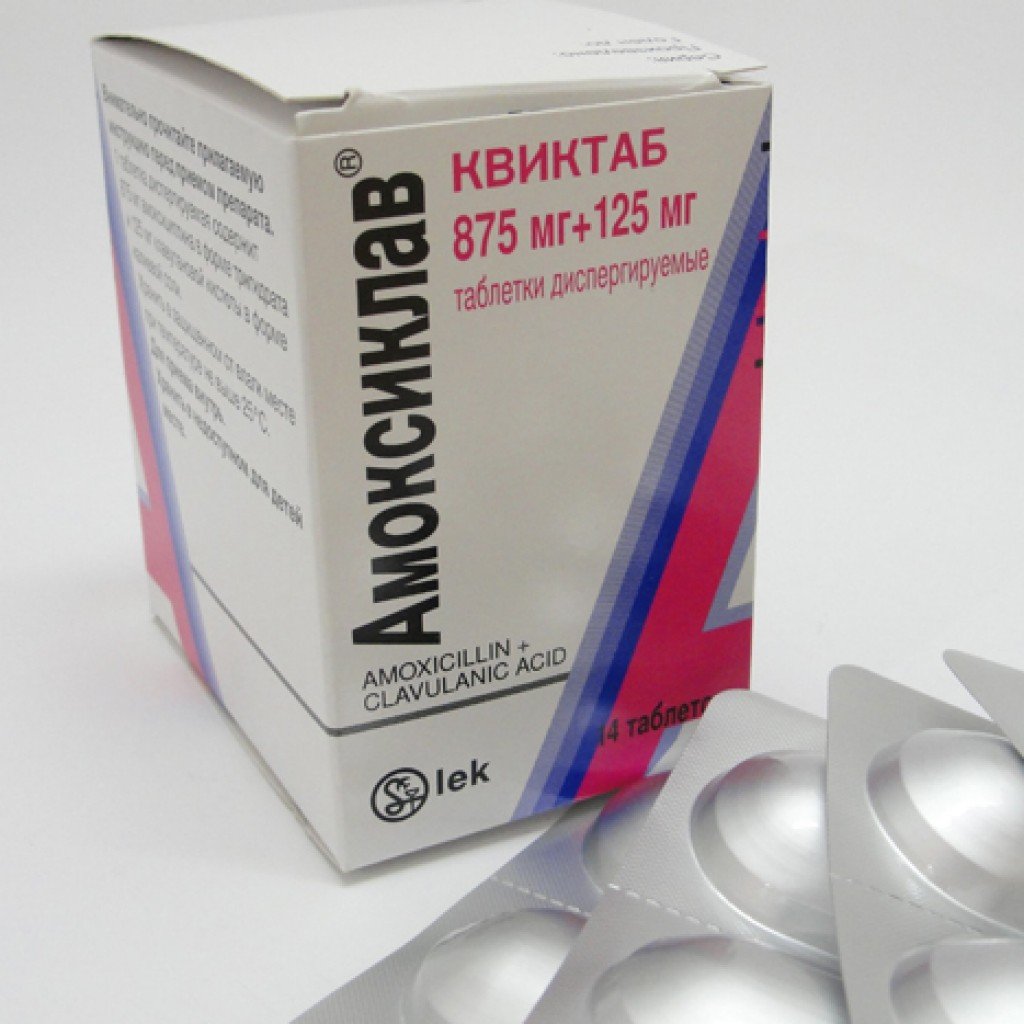
Taking Amoxiclav, you can cure the flu in a couple of weeks
Erythromycin
Erythromycin may also be prescribed for the flu and colds. This product is available in tablets, eye ointment, and powder for solution preparation.
Anyone over 14 years old should drink no more than 2 grams per day. Moreover, at least 6 hours should pass between receptions.
In the most severe cases, the dosage is increased to 4 grams.
Young children need to drink 50 milligrams per kilogram twice a day. At the discretion of the doctor, an increase in the dose is possible. So it is possible to give this medicine to a child, if there is permission and instructions from the doctor. It is not worth deciding on your own whether these antibiotics are needed or not.
Influenza is treated with a wide variety of medications, not just any one of them. Complex therapy is needed for a quick recovery and avoidance of consequences.
When it comes to choosing the right antibiotic, it’s not even a matter of price. Sometimes inexpensive drugs are quite effective. The doctor, first of all, looks at the individual characteristics of the patient's health, the strength of his immune system, checks whether possible side effects will worsen the already not very good state of the body.
On what day are these drugs usually prescribed? Not until the serious complications of the flu begin.
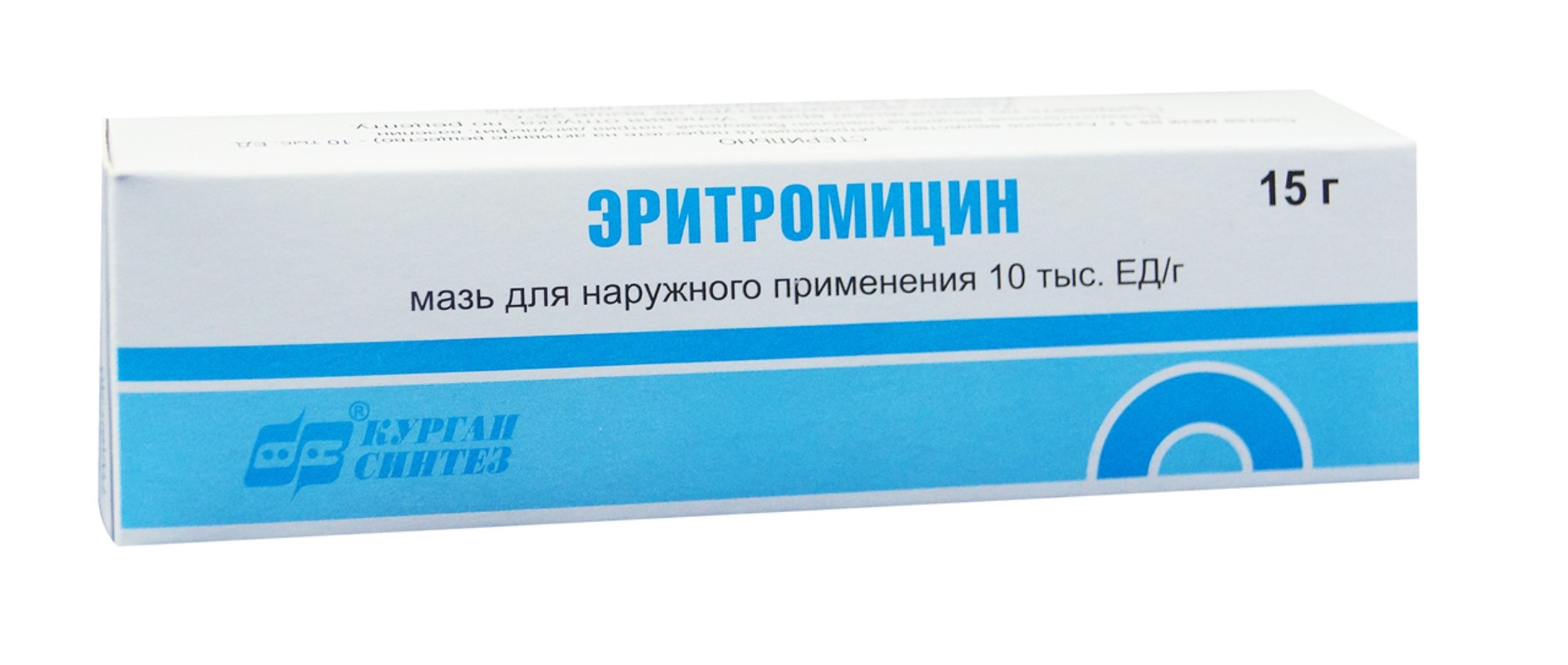
Erythromycin helps even in the treatment of severe flu
Naturally, for cancer patients, pregnant women, women during lactation and people with weak immunity, a separate course of antibiotics is prescribed.
Before starting treatment for influenza, you need to make sure that the diagnosis is correct. For this purpose, the following methods are used:
- exceptions (the occurrence of symptoms resembling those of influenza during the period of an epidemic rise in incidence after contact with a patient with influenza in history);
- evidence (detection of the pathogen RNA in blood, saliva, virus antigens in nasopharyngeal washings, antibodies to the virus in peripheral blood).
The most correct is a combination of diagnostic options, but if necessary, a quick choice of a therapy regimen is based on the characteristics of the clinical picture and anamnesis.
Influenza is caused by a virus - etiotropic agents capable of acting on the pathogen are antiviral drugs of the adamantane groups (amantadine), neuraminidase inhibitors (oseltamivir). They are active against the influenza virus, but not against the rest of the ARVI provocateurs. Therefore, it is necessary to differentiate influenza and adenovirus, rhinovirus, respiratory syncytial infection in order to avoid unreasonable prescription of antiviral therapy. Given these features, a logical question arises: is the flu treated with antibiotics?
Antibacterial agents, like antiviral agents, are divided into many groups. Their effectiveness depends on the presence of a "point of application" - for example, penicillins block the synthesis of a component of the bacterial cell wall - peptidoglycan, and macrolides disrupt protein production on the ribosomes of a bacterial cell.
Each group of antibiotics has its own spectrum of action according to the types of pathogenic microorganisms.
The structure of viruses differs from the structure of bacteria - antimicrobial agents cannot act on any virus. Therefore, it is worth thinking about what antibiotics to drink for the flu, only if a microbial infection is attached.
Bacterial infection and flu
Among bacterial complications influenza that require antibiotic treatment include:
- Pneumonia.
- Otitis.
- Sinusitis.
Pneumonia is an inflammation of the lung tissue. It is necessary to distinguish between viral hemorrhagic pneumonia, complicating the course of "avian" and bacterial, which develops as a result of infection with Staphylococcus aureus, Haemophilus influenzae and other pathogenic microorganisms. It manifests itself:
- weakness;
- headache;
- fever;
- productive cough;
- chest pain;
- shortness of breath.
Otitis media occurs when the outer, middle or inner ear is affected. The most common otitis media caused by a bacterial infection. The disease is characterized by the following symptoms:
- weakness, fever, headache;
- discharge of a purulent character from the ear canal;
- intense ear pain;
- feeling of ear congestion.
Sinusitis is called inflammatory process, localized in the paranasal sinuses. It is characterized by severe headache (sometimes one-sided), nasal congestion, difficulty in nasal breathing, and purulent nasal discharge. In patients, the general condition, appetite and sleep are disturbed, weakness, fever are noted.
Antibacterial therapy
Treatment with antibacterial agents is indicated only for complications associated with a bacterial infection.
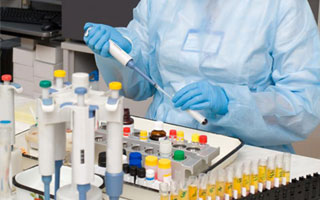 The diagnosis can be justified using clinical signs, additional research methods:
The diagnosis can be justified using clinical signs, additional research methods:
- general blood analysis;
- sowing biomaterial (sputum) on nutrient media;
- organ radiography chest and etc.
What antibiotics should I take for the flu in case of bacterial complications? It is unacceptable to start antibiotic therapy on your own - one should take into account the spectrum of probable pathogens, the age and condition of the patient, the presence of contraindications, the required duration and frequency of administration. In addition, self-medication can distort the picture of the disease and interfere with the correct diagnosis. It is necessary to choose the dosage of the drug - dose fluctuations in the lower direction contribute to the development of resistance and reduce the effectiveness of treatment, and in a larger one - increase the risk of side effects. With purulent infections, one antibacterial drug is not always enough, therefore it is important to determine the most effective combination. A good antibiotic for influenza can only be found by a doctor.
If pneumonia is suspected, antibiotic therapy is mandatory.
The same applies to purulent sinusitis, purulent otitis media. Reception begins immediately after establishing the presence of a complication, body temperature indicators are monitored to assess the effectiveness of drugs. The drugs of choice are broad-spectrum antibiotics that can target Staphylococcus aureus and other bacteria suspected of causing the condition. These include:
- Protected penicillins (amoxiclav, augmentin).
- Cephalosporins (cefotaxime).
- Macrolides (azithromycin).
- Carbapenems (meronem).
Antibacterial agents are part of complex therapy and are used in combination with antihistamines, antipyretics, mucolytic drugs and non-drug treatments.
Every year, with the onset of cold weather, residents of our country begin to prepare for a flu epidemic. Numerous statements by specialists about the spread of new, mutated viruses, the widely discussed statistics of outbreaks of the disease, the introduction of quarantines and reports of fatalities are prompting Russians to purchase a huge amount of medical supplies for the future. Antibiotics are very common on the shopping list. They are absolutely useless against influenza, but, unfortunately, not everyone knows about it.
It is impossible to underestimate the insidious ailment: influenza is one of the most dangerous diseases from the ARVI group.
Every year, the disease and its complications claim the lives of 2 million people on our planet.
According to Rospotrebnadzor, in Russia every 12 months about 20% of the population go to hospitals with flu symptoms. Strict adherence to the recommendations of doctors and adequate therapy help to get rid of the disease in time and avoid serious health consequences.
 Russians who prefer to self-medicate at the first sign of influenza ( sharp rise temperatures, weakness, muscle and headaches, pain in the eyes, disruption of the gastrointestinal tract), begin to take antibiotics, and thus facilitate the vital activity of the viruses that cause the disease. By destroying the beneficial microflora of the body with drugs, a person removes the last barrier to the reproduction of pathogens and lowers his immunity.
Russians who prefer to self-medicate at the first sign of influenza ( sharp rise temperatures, weakness, muscle and headaches, pain in the eyes, disruption of the gastrointestinal tract), begin to take antibiotics, and thus facilitate the vital activity of the viruses that cause the disease. By destroying the beneficial microflora of the body with drugs, a person removes the last barrier to the reproduction of pathogens and lowers his immunity.
You should be aware that antibiotics for flu and colds are not among the funds that must be used when an illness occurs. Antibacterial and antimicrobial drugs do not affect the growth of colonies and the reproduction of infectious agents.
These medicines are prescribed only if third-party pathogens join the flu that provoke the development of various kinds of complications (bronchitis, pyelonephritis, purulent tonsillitis, pneumonia, otitis media, etc.).
Supplementing therapy with generic drugs
Inclusion in the regimen of standard antibiotic treatment is carried out by a doctor in the following cases:
- the observed improvements in well-being on the 5-6th day from the onset of the disease are abruptly replaced by an increase in temperature and fever;
- examination reveals an increase in lymph nodes (cervical, submandibular), wheezing in the lungs;
- the patient complains of shortness of breath, increased chest pain, difficulty swallowing.
![]() All of the above signs indicate the development of complications. It was at this time that the specialist of the clinic, observing the patient, prescribes additional tests and, as a result, recommends taking certain antibacterial (antimicrobial) drugs. In some situations, when the associated infection develops at a rapid pace, therapy is immediately expanded with universal drugs (broad-spectrum antibiotics).
All of the above signs indicate the development of complications. It was at this time that the specialist of the clinic, observing the patient, prescribes additional tests and, as a result, recommends taking certain antibacterial (antimicrobial) drugs. In some situations, when the associated infection develops at a rapid pace, therapy is immediately expanded with universal drugs (broad-spectrum antibiotics).
The above methods of treatment are applied not only to adult patients, but also to children, pregnant women.
List of popular medicines
Most often, drugs of the following groups are involved in antibiotic treatment:
- Penicillins (Ampicillin, Panklav, Amoxicillin, Flemoxin Solutab) are characterized by low toxicity; act on pathogenic agents, destroying cell walls. They have a number of side effects on the body, among which manifestations of allergic reactions are most common.
- Cephalosporins (Zinacef, Cefazolin, Cefpirome) - violate the cell membranes of pathogens. For the treatment of complications of influenza in adults, it is prescribed intramuscularly. In severe cases of the disease, these drugs are also used in pediatric therapy.
- Fluoroquinols are DNA-damaging agents for pathogens. Representatives of a group that has no equivalents in nature are Moxifloxacin, Levofloxacin, Avelox - antibiotics for influenza and colds used only in the treatment of adult patients.
- Macrolides (Sumamed, Erythromycin, Azitrox, Azivok, Macropen) - are used in case of allergies to other types of antimicrobial medicines. They are effective against a wide range of inflammatory diseases.
Only a doctor can decide which antibiotics to take for the flu. The acquisition and further use of medicines without the advice of a specialist is prohibited.
The best remedies
The following list contains the names of drugs that are considered the most effective in medical practice and are used for various complications after influenza:

It must be remembered that to unequivocally answer the question "Which antibiotic is better?" impossible. Each disease requires a specific type of involvement medicines, with the recommendation of which the individual characteristics of the patient's body, the presence of specific ailments in the anamnesis, the patient's age are taken into account.
Treatment of complications from influenza in children
The choice of drugs for pediatric therapy should only be dealt with by a specialist in a medical institution.
Antibiotics prescribed for influenza to young patients can provoke the development of additional diseases (thrush, dysbiosis, etc.), so parents should carefully follow all medical recommendations and monitor the child's well-being.
The most common methods of treating complications of the above disease in pediatrics are:
- suspensions of Zinnat, Sumamed, Augumentin;
- ampicillin tablets;
- infusion and injection of Zinacef.
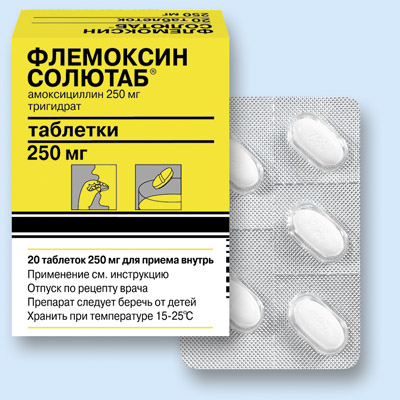 The antibiotic in suspension for influenza in children is characterized by a mild effect and rapid absorption, has a pleasant taste and aroma. Syrups are used in treatment regimens for the smallest patients; the calculation of dosages is based on the child's body weight.
The antibiotic in suspension for influenza in children is characterized by a mild effect and rapid absorption, has a pleasant taste and aroma. Syrups are used in treatment regimens for the smallest patients; the calculation of dosages is based on the child's body weight.
Injections and droppers are prescribed for babies only in case of severe complications, and are carried out under the strict supervision of a doctor.
To maintain immunity and reduce side effects, treatment is supplemented with prebiotics, probiotics, and vitamin complexes.
Preparations for pregnant women
Complications after influenza are often diagnosed in women who are expecting a baby. The scheme for taking sparing antibacterial medicines is developed by the doctor after assessing the possible negative effect on the fetus and taking into account the timing of pregnancy.
Most often, antibiotics Flemoxin, Erythromycin, Oxamp, Azithromycin appear in recipes for the treatment of a future mother.
In order to exclude allergic reactions and disturbances in the activity of the gastrointestinal tract, therapy is supplemented with antihistamines, diet, and fermented milk products are recommended.
Diseases that arise during lactation are stopped by injections of cefazolin.
Application features
The average duration of antibiotic therapy is from 5 to 7 days (in severe forms of the disease, the appointment of antimicrobial drugs can be extended up to 10 days). An improvement in well-being usually occurs on the third day from the start of treatment. If no positive results are found, the drug is replaced.
During therapy, it is prohibited: 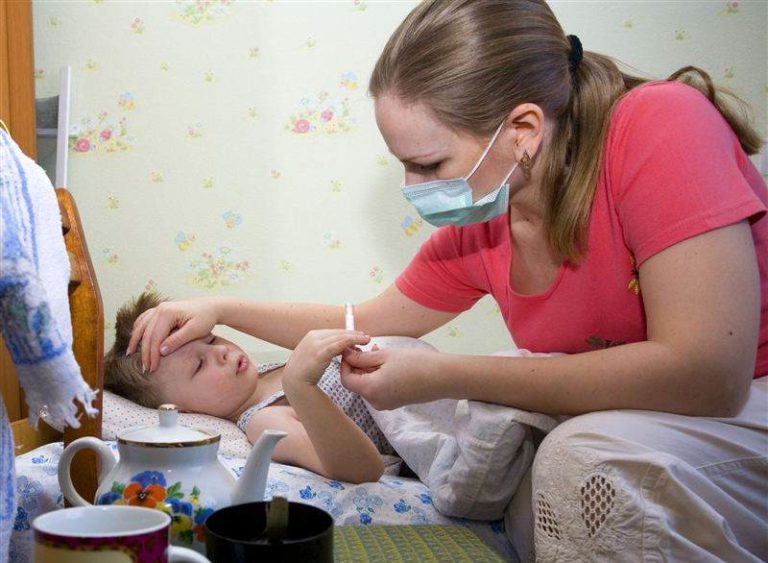
- drinking alcohol;
- interrupt the course of treatment;
- drinking the medicine randomly, without taking into account the time intervals between doses;
- independently increase or decrease the dose of the medication.
The main rule in the treatment of complications after influenza is a timely visit to the clinic, whose specialists will conduct the necessary examinations, recommend which antibiotics to drink, and prescribe the correct dosage of the drug. Can't self-medicate, use for therapy folk remedies, postpone a visit to the doctor, as this can lead to the onset of superinfection and the active development of the disease.
